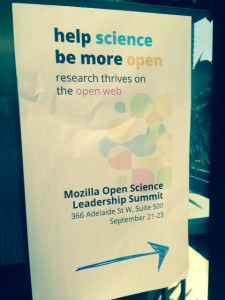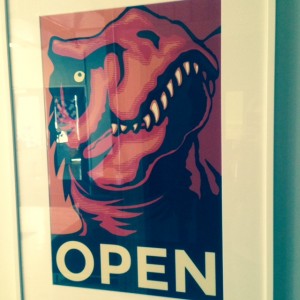 Late last September, I was invited to join Mozilla Science Lab’s three-day Open Science Leadership Summit in Toronto. The purpose of the event was to bring scientists, librarians, programmers and other open science community members to report on projects, discuss shared challenges, and learn new skills. Though I’m an avid supporter of open source software—an overlapping, but not altogether synonymous community—I have no formal involvement in open science. Neither am I a scientist. Instead, I was to join as the group’s sole humanist with the purpose of speaking about the collaborative potential between our two, long estranged academic cultures.
Late last September, I was invited to join Mozilla Science Lab’s three-day Open Science Leadership Summit in Toronto. The purpose of the event was to bring scientists, librarians, programmers and other open science community members to report on projects, discuss shared challenges, and learn new skills. Though I’m an avid supporter of open source software—an overlapping, but not altogether synonymous community—I have no formal involvement in open science. Neither am I a scientist. Instead, I was to join as the group’s sole humanist with the purpose of speaking about the collaborative potential between our two, long estranged academic cultures.
The invitation had come largely by chance. A few weeks prior I had met Mozilla Science Lab’s former community manager, Bill Mills, a quantum physicist and software developer, who founded Mozilla Science Study Groups, a network of skill sharing and community building among scientists looking to improve their technical chops. During our meeting, which was organized by another champion community builder, our former digital fellow Evan Misshula, I discovered that—despite our disciplinary differences—Bill and I were both tremendously excited about the potential of collaboration and spent a good deal of time thinking about ways to foster it in our respective academic communities. I was soon convinced—in no short part due to Bill’s contagiously-welcoming personality—that the digital humanities and open science communities not only had much to learn from each other but might also have a unique collaborative opportunity of their own. Thus, I was thrilled when shortly after our meeting, Mozilla invited me to spend three days with the open science community to explore this possibility further.
But as the date of the summit neared, I feared Mozilla’s warm invitation had been wasted on the wrong humanist scholar. Yes, I shared their vision of a world bettered by collaborative research that transcended disciplinary and institutional boundaries, but what would words could I offer that might actually be of use? How exactly could our two academic cultures meaningfully converse when our subject matter is so radically diverse? What common language and shared goals might actually provide grounds for listening? The night before my flight to Toronto I dreamed of nervously reciting limericks before a crowd of R2-D2 robots whose blinks and beeps only conveyed deep boredom and hostile disregard.
Before going any further, I should first clarify some of the main activities and goals of open science movement, though I do so as a novice and welcome amendments from the open science community itself! Michael Nielsen, one of the community’s early advocates, as well as a quantum physicist and science writer, describes it as the “idea that scientific knowledge of all kinds should be openly shared as early as is practical in the discovery process.” This permissive attitude flies in the face of traditional practices of scientific research dissemination which rely on subscription-based scholarly journals and prolonged procedures of peer review to circulate findings among the scientific community. As Nielsen explains, the journal system may have been an “excellent example of open science” in the 17th and 18th centuries in which it emerged, but today, it’s unjustifiably slow, elitist and inaccessible when compared to contemporary communication practices. Thus proponents of open science argue that scientists should embrace new web technologies to generate more productive and “frictionless” forms of scientific collaboration. The challenge, however, is not only creating new tools and online portals for sharing research, but also changing the culture which depends on traditional publication as a means of professional evaluation. Not coincidentally, these same issues are at play within humanities academic publishing, as written about by scholars such as Kathleen Fitzpatrick.
 But practicing and promoting new forms of sharing research is not the only activity which occupies the open science movement. Anyone whose science education trailed off in high school may not appreciate the full extent to which scientific research is increasingly reliant on computational methods. Whether you’re researching black holes or the microbiome, chances are your research is based on analyzing vast sets of data. The increasing reliance on computation in science leads to several interesting characteristics. First, scientific research not only requires traditionally trained scientists, but also specialists in informatics or programming languages who do not necessarily possess a large amount of scientific training. As one Summit attendee explained to me, his technical skills enabled him to make sophisticated predictions regarding gene function, but he was not able to physically describe a gene the way one might expect of a traditional scientist. Second, many scientists, in addition to conducting research, are expected or compelled to quickly teach themselves programming languages without any formal support or training, especially when joining a new lab as a graduate student or post doc. Third, both the processes and products of scientific research are in many cases either raw data or code used to analyze data, both of which can be easily shared for reuse, reproducibility, and repurposing in other experiments, which leads to conditions immensely favorable for global and interdisciplinary collaborations previously inconceivable.
But practicing and promoting new forms of sharing research is not the only activity which occupies the open science movement. Anyone whose science education trailed off in high school may not appreciate the full extent to which scientific research is increasingly reliant on computational methods. Whether you’re researching black holes or the microbiome, chances are your research is based on analyzing vast sets of data. The increasing reliance on computation in science leads to several interesting characteristics. First, scientific research not only requires traditionally trained scientists, but also specialists in informatics or programming languages who do not necessarily possess a large amount of scientific training. As one Summit attendee explained to me, his technical skills enabled him to make sophisticated predictions regarding gene function, but he was not able to physically describe a gene the way one might expect of a traditional scientist. Second, many scientists, in addition to conducting research, are expected or compelled to quickly teach themselves programming languages without any formal support or training, especially when joining a new lab as a graduate student or post doc. Third, both the processes and products of scientific research are in many cases either raw data or code used to analyze data, both of which can be easily shared for reuse, reproducibility, and repurposing in other experiments, which leads to conditions immensely favorable for global and interdisciplinary collaborations previously inconceivable.
Broadly speaking then, digital humanities and open science share many common challenges. Both communities are struggling to reinvent practices of knowledge circulation while simultaneously facing the daunting task of learning new computational methods. In some cases these computational techniques have become so broadly applicable that scientists have even begun analyzing culture using methods of genomic analysis. In theory, there was a lot that I might talk about. Yet despite these glaring similarities, and both communities’ vocal dedication to collaboration and openness, I felt less and less sure about ways to build relevant bridges between the two. As if science wasn’t already intimidating enough, now it was further transformed by computation into some incomprehensible combination of two of society’s most esoteric arts!
Ironically, however, it was this very struggle which turned out to be one of the key preoccupations of summit. A day before its start, I came across a blog post by Mozilla Science Lab’s new Instructional Designer, Zannah Marsh, which discusses the challenges of joining a new community and immersing oneself in an unfamiliar language. In her post, “Sprints, Selectors, and Pandas: On Learning in the Open,” Zannah argues that instead of concealing our confusion during these learning processes we should practice “open confusion” by becoming more comfortable in articulating our ignorance to ourselves and others. In this way, she writes, “we could use our confusion to open up our learning processes, get help, and create relationships with other learners and teachers along the way, and improve the learning experience for everyone in our community.”
Far from being a marginal perspective on open science, Zannah’s post expressed one of the summit’s overarching questions: how might open science projects be structured so that “outsiders” can meaningfully participate? Open science, after all, is not meant merely to benefit the careers and intellectual satisfaction of professional scientists, but rather to further unlock the pursuit and fruits of scientific research to the world at large. Furthermore, the increasingly interdisciplinary and technical nature of scientific research makes it so that all experts are most likely also novices in other skills and subjects useful for their work. Thus, one of the most important challenges of the open science movement is neither scientific nor technical, but social. Though technical skills and and scientific expertise are obviously fundamental to scientific research, their effects can only be as strong as the community in which they circulate. Throughout the summit, we discussed ways to incorporate non-expert collaborators into research projects, study groups and other activities that are vital to the cultivation of the open science movement. (One activity I fully recommend replicating is using this web based text editor to explain your project using only the top one thousand most commonly-used words.)
And so, what I had worried would be an event awash in technical expertise and incomprehensible dialogue turned out to be friendly and engaged conversation around themes I encounter often within the digital humanities. Our tools for producing and communicating research are evolving. How then might we deliberately evolve our culture of research to take the most advantage of these new capabilities? And what if collaboration—across disciplines, perspectives, and global communities—rather than the research itself, turns out to be its biggest gift?




RT @Digital_Fellows: Open science and the digital humanities: Late last September, I was invited to join Mo… http://t.co/2AqVIih2fL